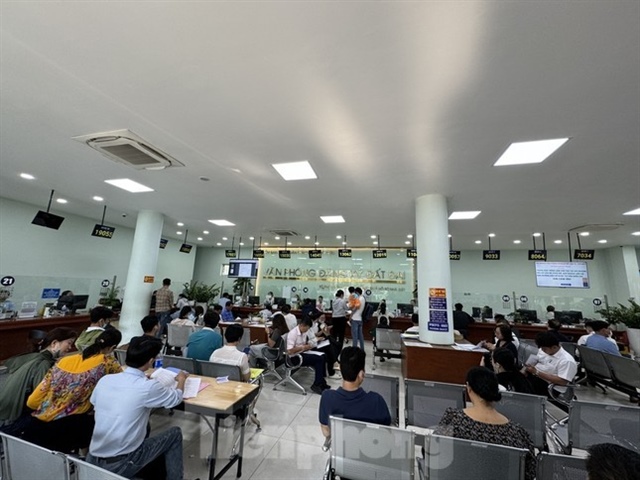Two Methods Being Considered
In a recent report to the National Assembly on the implementation of questioning resolutions, the Ministry of Finance revealed that it is exploring two methods for calculating personal income tax on real estate transfers. The first method involves taxing profits (sale price minus related costs) while the second method applies a fixed tax rate on the total transfer value.
 The Ministry of Finance is considering two methods for calculating personal income tax on real estate transfers. |
According to the report, if there is a database that can accurately determine the purchase price and related costs, such as taxes and fees, a 20% tax rate will be applied to the taxable income (sale price minus total costs associated with the transferred real estate). In cases where the purchase price and costs related to the real estate transfer cannot be determined, the personal income tax will be calculated by multiplying the total value of the transferred real estate by a 2% tax rate.
In reality, the proposed 20% tax rate is not a new idea. The 2007 Personal Income Tax Law previously stipulated a 25% tax rate on profits or 2% on the transfer value of real estate if the cost basis could not be determined. However, due to difficulties in verifying these factors, the tax rate was set at 2% of the total transfer value from 2015 onwards.
This 2% calculation method has created several loopholes. Specifically, sellers can underdeclare the transfer value to reduce their tax liability, leading to budget shortfalls and distortions in the real estate market. Moreover, many experts argue that it is unfair for sellers to pay taxes even when they incur losses.
The proposal to tax real estate transfer profits resurfaces amidst some positive changes. According to the Ministry of Finance, it is now possible to retrieve transaction data from 2018 onwards, including land transaction history and taxpayer information.
 People submitting land transfer documents at the Land Registration Office in Thu Duc City. |
Returning to the method of taxing profits is seen as a way to align with the nature of personal income tax, which is designed to tax actual income earned.
However, the Ministry of Finance acknowledges that accurately determining profits remains challenging. The transfer price stated in the contract may not reflect the actual price; moreover, certain costs, such as brokerage fees, interest expenses, compensation, or the value of inherited real estate, are difficult to ascertain for calculating the cost basis.
Accurate Calculation is Key
Ms. Tran Thi Cam Tu, CEO of EximRS, pointed out the potential impacts of the proposed 20% tax on real estate transfer profits compared to the current 2% tax on the total transaction value. On the positive side, if profits are low or negative, the 20% tax on profits could result in a lower or zero tax liability compared to the 2% tax on the total value, regardless of whether there is a profit or loss. For instance, if a property is sold for VND 5 billion, and the purchase price was VND 4 billion with additional costs of VND 800 million, the new tax calculation would be (VND 5 billion – VND 4.8 billion) x 20% = VND 40 million, whereas the current tax would be VND 5 billion x 2% = VND 100 million. This approach encourages long-term investment, discourages speculation, and promotes market transparency.
However, in cases of significant profits, the 20% tax rate could result in a much higher tax liability compared to the 2% rate. For example, if a property is sold for VND 10 billion and purchased for VND 4 billion, the new tax calculation would be VND 6 billion x 20% = VND 1.2 billion, while the current tax would be VND 10 billion x 2% = VND 200 million. This scenario creates challenges in proving costs such as brokerage fees, interest expenses, and inheritance, leading to potential disputes or higher-than-expected taxes.
Ms. Tu emphasized that investors need a transparent market for sustainable development, and transparency requires a process to build relevant data and supporting regulations. Given the recent challenges in the market, investors and real estate businesses hope that new policies will consider the context of their implementation to avoid negative impacts.
Using the difference between the purchase and sale prices to calculate taxes may not be reasonable if people buy real estate for their own use, whether for living or production purposes, and only transfer the land-use rights many years later.
“When calculating the 20% tax, brokerage fees should also be taken into account. Sellers may include this tax in the sale price, shifting the cost to buyers, which could further drive up real estate prices, making it harder for buyers to afford homes and creating challenges for businesses as well,” Ms. Tu added.

A hasty implementation of the 20% tax rate on real estate transactions could have unintended consequences. |
Mr. Hoang Kim Hoai, CEO of Phuc Dien Land, also cautioned against rushing to implement the 20% tax rate on real estate transactions. He emphasized the need for time to build a comprehensive database related to real estate transfers. Clear regulations are required to outline deductible expenses and conditions regarding invoices, vouchers, and cost basis of the transferred real estate. Additionally, it is crucial to accurately calculate all incurred expenses, such as bank interest, brokerage fees, inflation adjustments, and renovation costs before the transfer.
Mr. Hoai believes that the current practice of applying a 2% personal income tax rate on the total sale price is appropriate. If sellers incur losses, it is due to market factors or their own speculative investments. In reality, some sellers may hold onto properties for 5 to 10 years or even longer, during which the price difference can be significant. In such cases, the new tax calculation method could put them at a disadvantage.
According to Mr. Le Hoang Chau, Chairman of Ho Chi Minh City Real Estate Association (HoREA), the regulation requiring a 2% personal income tax on the sale price of real estate should be abolished. Personal income tax is based on the principle that only those with income (i.e., profits) should pay taxes.
However, the current regulation results in situations where sellers who break even or incur losses still have to pay personal income tax, which is unreasonable. To implement a profit-based tax calculation, there must be a comprehensive basis for determining taxable income, but there are still many shortcomings in this regard.
“When formulating the 20% profit-based tax calculation, factors such as inflation, price index, and construction costs of real estate must be taken into account. To do this, the state must be able to calculate the legal, reasonable, and legitimate costs incurred by the owner of the land or property,” Mr. Chau explained.
Duy Quang
– 10:10 19/05/2025
Consider Carefully Before Adding Sugary Drinks to the List of Excise Tax Items to Avoid a “Double Whammy.”
The National Assembly continued its 9th session on May 9th, with discussions on the draft Law on Special Consumption Tax (Amended). Chaired by Vice Chairman Nguyen Duc Hai, the National Assembly debated several contentious aspects of the proposed legislation. This draft law is one of 34 legal projects that the National Assembly will consider during this session.
The Tax Refund Conundrum: Why is it Still a Challenge?
The personal income tax finalization deadline for 2024 has passed, but tax refund issues persist. Apart from automatic refunds, individuals face challenges such as discrepancies between tax amounts when filing returns and using the eTax Mobile app, and a lack of updates on previously paid taxes.
“Don’t Equate the 20% Tax Levy on Real Estate Capital Gains to Every Home Seller”
“Experts suggest that a 20% tax on real estate transfer profits should be targeted at the right individuals and not applied uniformly. This is especially important when considering the needs of those seeking genuine accommodation. The proposal aims to curb speculation and ensure a stable market, but it is crucial to differentiate between investors and those seeking a home.”
“Proposed 20% Capital Gains Tax on Property Transfers: A New Revenue Stream for the Ministry of Finance”
The Ministry of Finance is exploring a proposal to introduce a 20% tax on the difference between the purchase and sale price of real estate, akin to a corporate income tax.





















